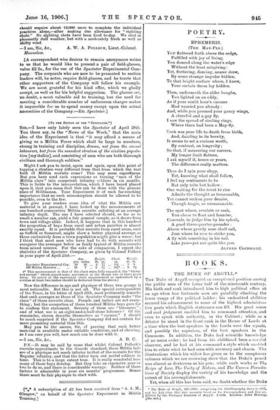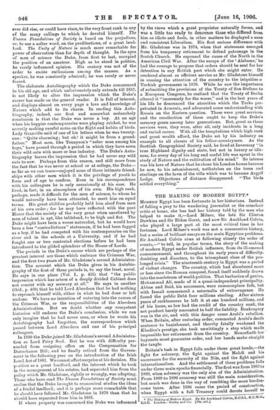BOOKS.
THE DUKE OF ARGYLL.*
THE Duke of Argyll occupied an exceptional position among the public men of the latter half of the nineteenth century. His birth and rank introduced him to high political office at an age when less fortunate men are painfully climbing the lower rungs of the political ladder : his undoubted abilities secured his advancement to some of the highest adniinistra- tire posts which English statesmen can fill. His good sense and cool judgment enabled him to command attention, and even to speak with authority, in the Cabinet ; while as a debater be stood in the front rank in the House of Lords at a time when the best speakers in the Lords were the equals, and possibly the superiors, of the best speakers in the Commons. In addition, the Duke had scientific knowledge of no mean order ; he had from his childhood been a careful observer, and be had at his command a style which enabled him to relate what he had seen with accuracy and charm. The illustrations which his widow has given us to the sumptuous volumes which we are reviewing show that the Duke's pencil was almost as dexterous as his pen ; while such works as The Reign of Law, The Unity of Nature, and The Unseen Founda- tions of Society display the variety of his knowledge and the extent of his accomplishments.
Yet, when all this has been said, we doubt whether the Duke • The Date of Argyll, 1323-100a, comprising his Autobiography (Iowa to 1537, and his Life from that date onwards based on his Correspondence and Diaries. Edited by the Dowager Duchess of Argyll. 2 vole. London: John Murray. 186e. net.] ever did rise, or could have risen, to the very front rank in any of the many callings to which he devoted himself. The
Unseen Foundations of Society is based on the prejudices, or, to use a softer word, on the predilections, of a great land- lord. The Unity of Nature is much more remarkable for power of observation than for depth of thought. In the eyes of men of science the Duke, from first to last, occupied the position of an amateur. High as he stood in politics, he rarely influenced opinion. His oratory was not of the order to excite enthusiasm among the masses. As a speaker, he was constantly admired; he was rarely or never feared.
The elaborate Autobiography which the Duke commenced in his old age, and which unfortunately only extends till 1857, is not likely to alter the impression which the Duke's career has made on the general reader. It is full of interest, and displays almost on every page a love and knowledge of Nature which add to its charm. In reading this Auto- biography, indeed, our first and somewhat melancholy conclusion is that the Duke was never a boy. At an age when his happier contemporaries were playing cricket, he was secretly making careful notes on the flight and habits of birds. Lady Granville said of one of his letters when he was twenty- one : " Quite charming ; but oh it might be from a grand- father." Most men, like Tennyson's "sober man among his boys," have passed through a period in which they have sown their wild oats with more or less industry. The Duke's Auto- biography leaves the impression that he had never any wild oats to sow. Perhaps from this reason, and still more from the fact that he was never at school or at college, the Duke— so far as we can trace—enjoyed none of those intimate friend- ships with other men which it is the privilege of youth to form and of age to confirm. Even in his correspondence with his colleagues be is only occasionally at his ease. He lived, in fact, in an atmosphere of his own. His high rank, perhaps, made it difficult for the men of science, to whom he would naturally have been attracted, to meet him on equal terms. His great abilities probably held him aloof from men of his own order ; for he may have reflected with the poet Moore that the society of the very great when unrelieved by men of talent is apt, like tableland, to be high and flat. The Duke might have been a worse naturalist, but he would have been a less "contradictious" statesman, if he had been fagged as a boy, if he bad competed with his contemporaries on the river and in the schools at a University, and if he had fought one or two contested elections before he had been introduced to the gilded splendour of the House of Lords.
The periods in the Duke's career which are perhaps of the greatest interest are those which embrace the Crimean War, and the first two years of Mr. Gladstone's second Administra- tion. The account which the Duke gives in his Autobio- graphy of the first of these periods is, to say the least, novel. He says in one place (Vol. I., p. 455) that " the public impression which has arisen of a deeply divided Cabinet does not consist with my memory at all." He says in another (ibid., p. 469) that be told Lord Aberdeen that be had nothing to reproach himself with, either in what he had done or left undone. We have no intention of entering into the causes of the Crimean War, or the responsibilities of the Aberdeen Administration. But we doubt whether any competent historian will endorse the Duke's conclusion, while we can only imagine that he had never seen, or when he wrote his Autobiography had forgotten, the correspondence which passed between Lord Aberdeen and one of his principal colleagues.
In 1880 the Duke joined Mr. Gladstone's second Administra- tion as Lord Privy Seal. But be was with difficulty per- suaded from resigning office on the Compensation for Disturbance Bill; and he finally retired from the Govern- ment in the following year on the introduction of the Irish Land Act of 1881. We cannot affect surprise at his decision. His position as a great landlord, and the interest which he took in the management of his estates, had separated him from the policy which Mr. Gladstone, rightly or wrongly, was adopting. Those who have read The Unseen Foundations of Society must realise that the Duke brought to economical studies the ideas of a feudal landlord; and it is perhaps more remarkable that be should have followed Mr. Gladstone in 1870 than that he should have separated from him in 1881.
If where property was concerned the Duke was influenced
by the views which a great proprietor naturally forms, and was a little too ready to denounce those who differed from him as idiots and fools, in other matters he displayed a sane and consistent Liberalism. His first serious difference with Mr. Gladstone was in 1874, when that statesman emerged from his temporary retirement to defend patronage in the Scotch Church. He espoused the cause of the North in the American Civil War. After the escape of the Alabama,' he had the courage to propose that orders should be sent for her detention in any British port which she might enter. He rendered almost as efficient service as Mr. Gladstone himself in rousing the attention of the country to the iniquities o Turkish government in 1876. While he saw the importance of submitting the provisions of the Treaty of San Stefano to a European Congress, be realised that the Treaty of Berlin altered it "immensely for the worse," and in the last years of his life he denounced the atrocities which the Turks per- petrated in Armenia, and advocated some understanding with Russia on the Eastern question. These were great services, and the recollection of them ought to keep the Duke's memory green among later generations. But, great as these services were, they were, after all, only incidents in a long and varied career. With all the temptations which high rank and great wealth afford, the Duke set by his industry an example to all classes of his fellow-countrymen. As the Scottish Geographical Society said, he lived at Inveraray " in true Highland dignity and state, but not in luxury or idle- ness, for every day of his long and useful life was spent in the study of Nature and the cultivation of his mind." So intense was his love of Nature that be chose his London house because he saw, to his astonishment, nuthatches on the trees and starlings on the lawn of the villa which was to become Argyll Lodge. Objections of distance disappeared. " The birds settled everything."











































 Previous page
Previous page